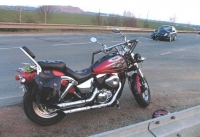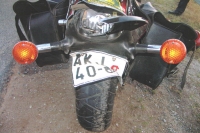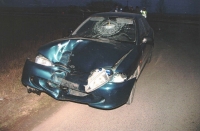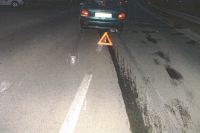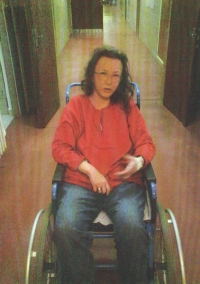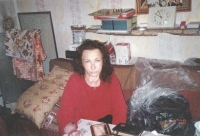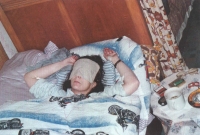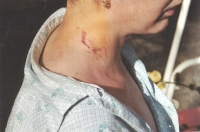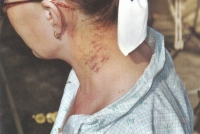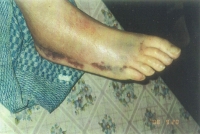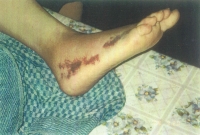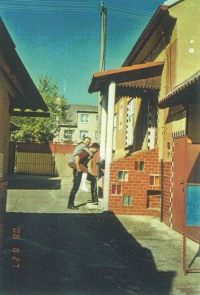Táta na mě stále dohlíží

Download image
Iveta Irvingová was born in Prague during the normalisation to the family of the „enemy of the people“, major general Jan Roman Irving, member of the British Royal Air Force and his wife, a widow of another RAF member. Iveta’s father was born on the 7th of March in 1915 in a small village of Lisov near Stod, soon after, the family moved to Uherce. He went through his apprenticeship in the Skoda factory in Plzeň and from 1931, he studied at the Secondary Technical School in Plzeň. Jan Roman went through pilot training at the army school in Prostějov and he was assigned as a sergeant pilot to the first air force batallion in Kbely. After the German occupation on the 15th March of 1939, he and his colleagues left the country to join the resistance abroad. He joined the French air force first, later he was assigned to the 11th Czechoslovak Infantry Battalion – Eastern. Later, he got to the famous No 311 (Czechoslovak) Squadron RAF and from July 1944 on, he worked as a flight instructor on the Bahamas. On the 26th of August 1945, after having received many awards, he returned to his homeland and in 1946, he started flying for the Czechoslovak Airlines (ČSA). Soon after, he was fired from ČSA and imprisoned at the Ruzyne prison, for the second time, he was imprisoned in 1956. The family, into which Iveta was born, was under constant surveillance of the State Security and had to endure frequent house searches. As the daughter of a pilot who had served on the West, Iveta was bullied all her life from kindergarten to employment. As a skilled typist, she got a job in the Central of the Trade Unions. Her life was intertangled with that of her father: she participated in meetings of former pilots. She retyped samizdats, participated in counter-regime protests at the end of the 1980’s, during the demonstration on the 28th October of 1988 that took place in the centre of Prague, she was arrested and interrogated. After the death of her father, she has been keeping his memory alive, she has been organising various events and writing her memoir. In 2008, she fell victim of a car accident, she was hit by a careless driver when riding her motorcycle.

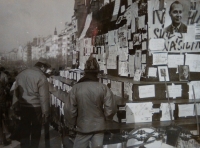








![Beginnings in the army - land training first [at the paratroop unit]](https://www.memoryofnations.eu/sites/default/files/styles/witness_gallery/public/2019-06/11..jpg?itok=vw6Q6QLl)

![Amateur-built airplane Koželuh [Tanner] which was acquired by the flying school. Here, the airplane was using sign B-12.1](https://www.memoryofnations.eu/sites/default/files/styles/witness_gallery/public/2019-06/16..jpg?itok=032o1Gpj)


































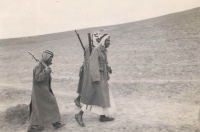

















![Practicing landing on water was the least popular part of the training. This exercise could save lives in case of emergency, even if it meant being captured if one found themselves in enemy waters, as general Alois Šiška could perfectly describe. He could "enjoy' a week on sea in a storm with his whole crew after being shot down. He described it in his book KX-B neodpovídá [KX-B does not answer]](https://www.memoryofnations.eu/sites/default/files/styles/witness_gallery/public/2019-06/81..jpg?itok=7tBmkEiP)
![Irving's crew in front of a Wellington at the East Wretham base shortly after their lucky return from the Grantham base where they had had an emergency landing on the 8th May of 1942. Their relief is apparent. From the left: Al. Novák, front gunner; Jiří Böhm, tail gunner; Jan Irving, captain [of the aircraft]; František Švejdar, wireless operator; Josef Stach, second pilot; Josef Němeček, navigator.](https://www.memoryofnations.eu/sites/default/files/styles/witness_gallery/public/2019-06/82..jpg?itok=DVmEYiaP)




























![Loading the camels was certainly no easy task.
One of the stories Jan used to tell: Once, he was flying a rather large amount of some small monkeys in cages, probably for one of the Czechoslovak zoos recovering from their war loses. One of the monkeys was probably quite bored during the flight because it played with the door latch until it opened the cage door. The monkey gladly ran out of the cage, enjoyed her newly discovered freedom and went on to liberate its simian buddies. The crew did not notice anything until they landed and opened the cargo space. Instead of their well-deserved rest, the airplane crew, along with the airport staff, spent several hours running around on the runway until they managed to catch all the monkeys.
On some other occasion, they flied a cargo of Olomouc cheese famous for its strong flavour, for the French connoisseurs to enjoy. It was in summer and after having landed in Paris, the staff opened the cargo space and the crew as well as the airport staff almost fainted, suffocated by the stench.
One could go on and on, Jan had a plenty of such stories. Some other stories of captain Irving and his colleagues were described in Josef Zacharda's wonderful book, Světla a stíny leteckého povolání [Highlights and shadows of the pilot's job], unfortunately long out of print.](https://www.memoryofnations.eu/sites/default/files/styles/witness_gallery/public/2019-06/125..jpg?itok=G7R9Iw7a)






































![Change was in the air and everyone felt that the totalitarian regime is about to collapse. A piece of proof was the first legal debate with our airmen [who served in the Western countries] in September 1989. It was organised by ROH [Revolutionary Union Movement, the trade unions with an exalted name] which happened in the Dlabačov hotel (after the Revolution, it was renamed Hotel Pyramida), although the meeting happened only in th small meeting room, just in case. The room was stuffed to the brim, though. Iveta took a bit of risk and she took this rare photograph. From the left: Jindřich Polák (director of the film Nebeští jezdci [Riders in the Sky]) and next to him the future three generals of the Riders if the Sky – Jan Irving, Alois Šiška and František Fajtl.](https://www.memoryofnations.eu/sites/default/files/styles/witness_gallery/public/2019-06/192..jpg?itok=yRA-PP8u)







![Colonel Irving was awarded the National Order of Merit [Ordre national du Mérite], in the grade of Knight, by the French military attaché, in May 1995 in the Legie Hotel in Prague. Colonel suffered from ill health, having been through two major surgeries including a heart bypass. The wounds caused by surgical incisions on his chest were healing badly and caused major pains so his caring wife Blanka had to support him.](https://www.memoryofnations.eu/sites/default/files/styles/witness_gallery/public/2019-06/207..jpg?itok=Ub3jJ0aS)
![Colonel Irving was awarded the National Order of Merit [Ordre national du Mérite], in the grade of Knight, by the French military attaché, in May 1995 in the Legie Hotel in Prague. This was a great occasion to toast with champagne. Jan Horal, owner of Duo hotel paid for the wine and serving staff. He never forgot the effort and personal risk of Jan Irving who regularly removed heaps of secret police‘s surveillance equipment from his room in the Alcron hotel.
(Jan Horal and Jan Irving feature in the documentary by V. Venclík, filmed in 1997 as Report on two Destinies. Those two demonstrate the differences of freedom in emigration and persecution in totalitarian regime. The document should be available from the archive of the Czech Television.)](https://www.memoryofnations.eu/sites/default/files/styles/witness_gallery/public/2019-06/208..jpg?itok=slf6Oei_)






![Another beautiful snapshot from a memorial ceremony at the Olšany cemetery. Behind Prince of Wales's back, a part of Jiří Maňák's face is showing, Jan Irving is smiling at one of his best friends, "tough guy" Bohumil Jaroš aka "Suchar" [~dry wit], at whose left, with a coat over his hands, colonel Malý is standing; on his right, wearing a beret, colonel Petr Uruba. Along with Zdeněk Škarvada, Vilda Bufka and others, they were imprisoned at the Sagan camp and later, they were moved to the famous German castle where officers were imprisoned, Coldwitz, and they shared the cells there.](https://www.memoryofnations.eu/sites/default/files/styles/witness_gallery/public/2019-06/216..jpg?itok=gxx4Ez-i)






![The air show brought many airmen from the UK and other corners of the world. There was the air show itself, meetings both formal and informal and quite a handful of other events. One of them was a celebratory mass, Te Deum, in the St. Vitus cathedral at the Prague Castle. Another strong experience. The Irving family is sitting in the first row. Next to Blanka, Jan's wireless operator, Arnošt Polák, is seated and at his right, Viktor Kent whose wartime nickname was „Vydrář“ [~otter catcher]](https://www.memoryofnations.eu/sites/default/files/styles/witness_gallery/public/2019-06/223..jpg?itok=F4qUDRTx)
![On the 15th September, 1991, there was a reunion at the Irvings' home at Vinohrady in Prague which was indeed memorable. Mrs. Blanka destroyed the airmen by wonderful roasted duck with dumplings, both red and white cabbage, and spinach, so that they could choose. She had guessed that this festive meal would meet with appreciation so there were two ducks in the oven. Her feeling was good, there was nothing left and she even packed some for the guests for later. The reunion was all over great, it was full of emotions, there we tears and laugh in one about the article Iveta had sent to Kanadské listy [Canadian Letters] which published them. On the porch, from the left, standing, Jan Irving, Iveta, Marcel Ludikar (a future general as well), Blanka Irvingová, Arnošt Polák, Ing. G. Shaw and Rudolf Nedoma, eighty percent of the most frequent crew of the Liberator. (This was photographed by Jan Horal, another invited guest.)](https://www.memoryofnations.eu/sites/default/files/styles/witness_gallery/public/2019-06/224..jpg?itok=Q9H2KF3q)
![One year after the reunion in the United Kingdom, the Czechoslovak airmen were invited to France and it went in a similar vein as the year before. This time, though, only the airmen went there, without any companions. It was distressing for Jan's wife, mainly because she was worried about Jan's health and what if something happened there. His heart was quite damaged after several heart attacks and every strong experience, even if positive, was deleterious. Iveta was sad that she would not see the war fields and France as such. Shown on the photograph are Jan Irving, Bohumil Jaroš aka "Suchar" [Dry-wit], faithful friends, in front of the Notre-Dame cathedral in Paris. During those days, they visited, among others, two air force bases, jet fighter base, and a bomber base which was one of the most important contemporary air base in France where they posed, along with the staff, under the much admired Mirage 2000. They also visited the military cemetery at La Target and many other places.](https://www.memoryofnations.eu/sites/default/files/styles/witness_gallery/public/2019-06/225..jpg?itok=c43Z1W6-)









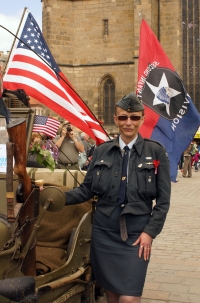
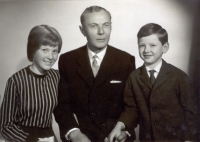
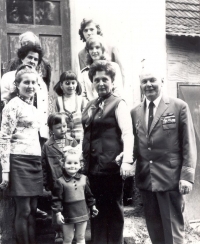
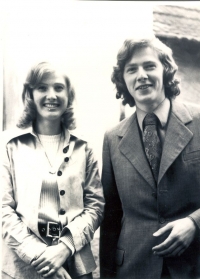
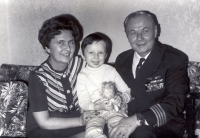
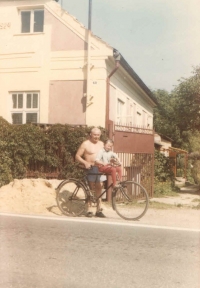
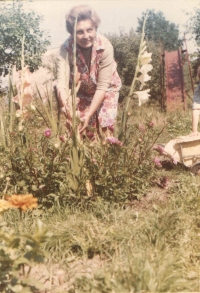
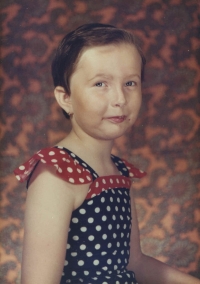
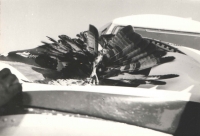

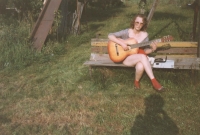
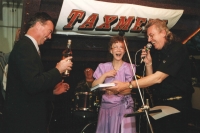
![The VIP guests included Jindra Polák, the director of Nebeští jezdci [Riders in the Sky, a 1968 movie]. and those airmen who remembered Ant in person. At the end of the book, there are their personal reminiscences and portrait photographs. Here, from the left: colonel JUDr. Lubomír Úlehla, colonel Jaroslav Hofrichter and Petr Jirmus. He is looking towards the stage where I’m probably talking to the microphone at the moment.](https://www.memoryofnations.eu/sites/default/files/styles/witness_gallery/public/2019-06/15._0.jpg?itok=V4uo7dbW)
!["After the book presentation, we got a photo taken in front of the bar. The paintings hanging there are oil paintings beautifully painted by Petr Hampl, M. A. {left); they were meant as illustrations for the book. Next to me, lieutenant colonel Jan Bozděch is standing. He is the son of the owner of Ant the dog, whose godfather was Jan Masaryk [the Minister of Foreign Affairs in the exile government in London during WWII].](https://www.memoryofnations.eu/sites/default/files/styles/witness_gallery/public/2019-06/16._0.jpg?itok=3AUptWQk)
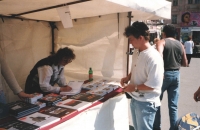
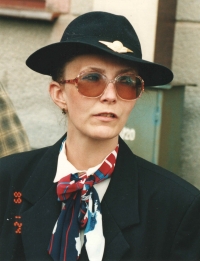
![A reminder of an anniversary concert of the Taxmen band. The photograph was taken at a party which took place in Mánes [gallery] probably at an anniversary of starting the Taxmen band; other artists participated as well. On the left, founder of Taxmen and a wonderful historian, Jaroušek Čvančara. Iveta as a co-organiser of the event added a bonus for the band members, she invited an astrologer, dr. Peter Messany, to foretell them further career. Far right, on Iveta’s left, there is another long term member of the band, owner of a mesmerising baritone, Vráťa Vyskočil. (This was in 2002 or 2003).](https://www.memoryofnations.eu/sites/default/files/styles/witness_gallery/public/2019-06/19._0.jpg?itok=j3IRrOnY)
